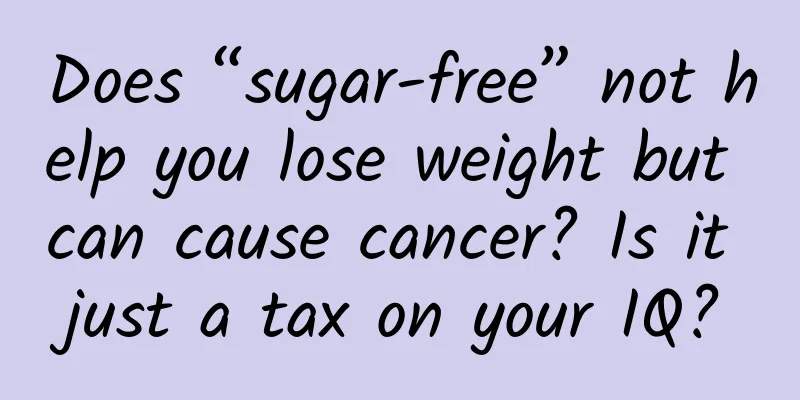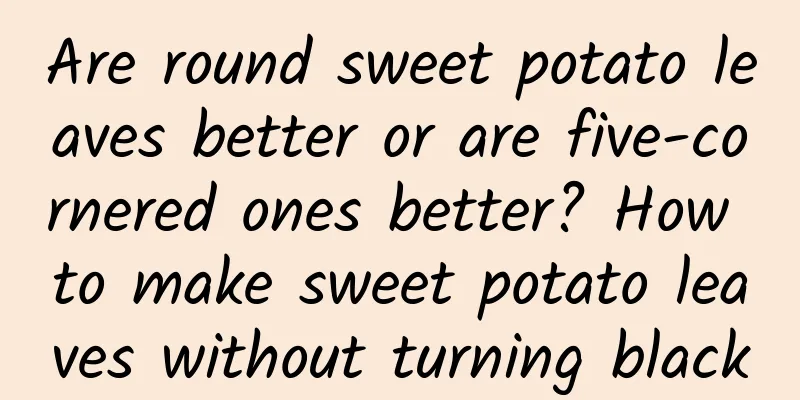Does “sugar-free” not help you lose weight but can cause cancer? Is it just a tax on your IQ?

|
People love and hate sugar: they love the satisfaction and happiness it brings, but they also worry about a series of health problems such as tooth decay, obesity, and high blood pressure caused by excessive intake. So, is there a perfect solution that allows people to enjoy the sweetness of sugar while avoiding the series of risks behind it? This brings us to "sugar substitutes". The selling point of "sugar-free food" has been popular for a long time, and the popular beverages with "0 sugar, 0 fat, 0 calories" have made sugar substitutes widely accepted by the public. However, as a food additive, sugar substitutes continue to be questioned by the public about their safety and health. On July 14 this year, with the news that "WHO lists aspartame as a possible carcinogen" occupying the headlines, sugar substitutes were once again pushed to the forefront of public opinion. So, what are sugar substitutes? What are the effects of consuming sugar substitutes on human health? Can sugar substitute foods be consumed safely? What is sugar substitute? When we choose packaged food, we are dazzled by the variety of products. However, when we turn to the ingredient list, the difficult chemical terms make us feel overwhelmed. Have you ever wondered why the package says "sugar-free" but it tastes so sweet? Is there "technology and hard work" behind it? In fact, this is related to the sugar substitutes in the ingredient list that are easily overlooked by people. To understand the sugar substitutes in the ingredient list, we must first start with the classification of sweeteners. Sweeteners refer to substances that can give food a sweet taste. Depending on whether they can generate calories to provide energy to the human body, sweeteners can be divided into nutritive sweeteners and non-nutritive sweeteners. Nutritive sweeteners, as the name implies, are sweeteners that can provide energy to the human body, mainly including sugars and sugar alcohols. Sugars are the main source of energy for our body. Common sugar sweeteners in life include glucose, fructose, lactose, sucrose, maltose, etc. Another type of nutritive sweeteners - sugar alcohols, including xylitol, erythritol, sorbitol, maltitol, lactitol, etc., can also provide energy for the human body, releasing about half the calories of sugars. Non-nutritive sweeteners also include two categories. One is sweeteners from natural sources, such as stevioside, mogroside, etc., which are sweeteners extracted from plants; the other is artificially synthesized sweeteners. Common sweeteners of this type include aspartame, sucralose (sucralose), saccharin, cyclamate, acesulfame potassium, neotame, etc. This type of sweetener is characterized by almost no calories but super high sweetness. Sugar substitutes are substitutes for sugar. Sugar alcohols in nutritive sweeteners and all non-nutritive sweeteners are sugar substitutes. If we have the habit of paying attention to the ingredient list, it is not difficult to find sugar substitutes. Among them, foods with labels such as "sugar-free", "0 sugar", "0 sucrose", and "low sugar" on the packaging are more likely to use sugar substitutes. Why use sugar substitutes? The preference for sugar is a mark engraved in human DNA. However, as material life continues to become richer, a series of health problems caused by excessive intake of sugar have become a bitter fruit that people cannot afford. At the same time, some special groups, such as diabetics, also expect their desire for sweetness to be satisfied. So, is there a substitute for sugar that allows people to enjoy sweetness without bringing health burdens? In 1878, American scientists invented sodium saccharin, and the concept of sugar substitute came into being. The way sugar substitutes are metabolized in the body is completely different from sugar. They cannot be fully absorbed, so they provide less calories to the human body. At the same time, many sugar substitutes are very sweet (the sweetness can be hundreds to thousands of times that of sucrose), and usually only a little bit of sugar substitute can achieve a sweetness similar to that of sucrose. For example, sodium saccharin, as the earliest artificial sweetener, is 350 times sweeter than sucrose. Neotame is more than 8,000 times sweeter than sucrose. In other words, the sweetness of a small spoonful of neotame can cover the sweetness of the sucrose you consume in a year. Therefore, the high sweetness and low calorie properties of sugar substitutes make it popular among people who want to lose weight. Moreover, ordinary sugar can cause blood sugar to rise, while most sugar substitutes do not participate in insulin metabolism in the body, so they have little effect on blood sugar fluctuations. Therefore, sugar substitutes can satisfy the desire of diabetic patients for "sweetness" without raising blood sugar, so they are deeply loved by diabetic patients. At the same time, sugar substitutes cannot be fermented by microorganisms in the mouth (some sugar substitutes are even good for teeth, such as xylitol, which is common in chewing gum), so they are also helpful in preventing tooth decay, which makes sugar substitutes one of the factors that parents may consider when choosing food for their children. From this perspective, sugar substitutes seem to have solved people's needs for both sweetness and health. However, are sugar substitutes really so "perfect"? Why do doubts about them keep emerging? The never-ending controversy over sugar substitutes In fact, ever since the birth of sugar substitutes, the controversy over their safety and health has never stopped. A review of the development history of artificial sugar substitutes will reveal that from the initial saccharin, sodium cyclamate, and aspartame to the six product iterations of acesulfame potassium, sucralose, and neotame, which are safer and taste better, almost every generation of artificial sugar substitutes has been subject to huge health controversies. On July 14, 2023, as the news that "WHO lists aspartame as a possible carcinogen" occupied the headlines, the discussion on the safety of sugar substitutes was once again pushed to the forefront of public opinion. The sugar-free cola we often drink contains the sugar substitute aspartame. Some studies have also suggested that erythritol may have the potential to cause blood clots and heart attacks. In a cohort analysis of more than 4,000 Americans and Europeans, researchers found that people with higher levels of erythritol in their blood were at a higher risk of cardiovascular and cerebrovascular disease. At the same time, subsequent animal experiments found that erythritol can promote platelet aggregation and increase the risk of thrombosis-this further confirmed that erythritol does have the potential to induce the above-mentioned diseases. The World Health Organization classifies aspartame as a Class 2B carcinogen New sweetener erythritol may have potential risk of blood clots and heart attacks Today, when food additives are often linked to "technology and hard work", the "sugar substitute storm" has undoubtedly increased the public's concerns about food safety. Can sugar substitute foods still be eaten? Is their safety guaranteed? How do you view the controversy surrounding the safety of sugar substitutes? First of all, regarding the controversy over the safety of sugar substitutes, the conclusion is: eat and drink with confidence, there is no need to worry too much. my country has very strict management on additives, and all sugar substitutes approved for use have undergone strict risk assessment. Before approving the use of each additive, it must undergo a lot of scientific research and data support, including acute toxicity, chronic toxicity, and various toxicity tests such as teratogenicity and carcinogenicity. Only when there are no problems will it be approved for use. At present, there are about 20 sweeteners approved for use in my country, such as aspartame, acesulfame potassium, saccharin, sodium cyclamate, sucralose, erythritol and steviol glycosides, all of which have a long history of safe use. In addition, "it is foolish to talk about toxicity without considering the dosage." my country's "National Food Safety Standard for the Use of Food Additives" (GB2760-2024) has specific provisions on the types of sweeteners allowed, their scope of use and their maximum usage. Using sweeteners according to the standards is safe. For example, food additives have an acceptable daily intake (ADI), which refers to the estimated amount of a substance that humans can consume daily throughout their lives without causing detectable health hazards. A food additive is harmful only when the long-term intake in animal models is more than 1 gram per kilogram of body weight. Then, this dose divided by 100 may become the value of the daily acceptable intake. In other words, under our normal diet structure, the amount of sugar substitutes we are exposed to is far from reaching the safety warning line. Sugar substitute = health? However, it should be noted that although the safety of sugar substitutes is guaranteed, sugar substitutes and health may not be equal. Sugar substitutes are not as bad as imagined, but they may not necessarily achieve the desired benefits. For example, if you want to lose weight with the help of sugar substitutes, then your beautiful fantasy may be shattered. Many people use zero-calorie drinks with added sugar substitutes as diet drinks, but in fact, the weight loss effect of sugar substitutes is not as simple and beautiful as everyone expects. The main reason is that the impact of a single food variable on the energy of the overall diet is uncontrollable. We eat food not only to obtain energy, but also to feel satisfied and happy through eating (food reward pathway). Although sugar substitutes provide sweetness to our taste buds, many researchers believe that sweetness without calories cannot fully activate the food reward pathway, which makes us want to get satisfaction after eating by eating more. The Department of Neurology at Yale University pointed out at a conference in 2010 that sugar substitutes can stimulate the sugar sweetness receptors in the hypothalamus of the human body and promote the secretion of dopamine, and increased dopamine secretion will stimulate the body's intake of other sugars. In other words, sugar substitutes may increase your appetite, which runs counter to the original intention of losing weight. In addition, some researchers believe that the use of sugar substitutes can also lead to a desire for and dependence on sugar, which is like "it is easy to go from frugality to luxury, but difficult to go from luxury to frugality". Sugar substitutes often have a strong sweet taste, so once you get used to the taste stimulation of high sweetness, you may find it difficult to tolerate a low-sugar diet. Therefore, consuming sugar substitutes may make people like sweetness more and increase their desire for high-sugar foods. Most importantly, the key to losing weight is to control the total energy balance. Sugar-free foods can easily give us a "no calories" psychological hint, thereby relaxing our vigilance against other unhealthy foods and lifestyles, and providing an excuse for eating high-calorie foods, sitting for long periods of time, and not exercising. Therefore, although the safety of sugar substitutes is controversial, as long as they are still approved for use and the dosage used in food complies with regulations, their safety is guaranteed. However, although sugar substitutes have certain benefits, it is still difficult to equate them with health. If you want to lose weight with the help of sugar substitutes, it may not only fail to achieve the expected reduction in calorie intake, but may also backfire and cause you to consume more calories. How to choose sugar substitutes After reviewing the controversy over sugar substitutes, we found that it is still difficult for sugar substitutes to perfectly match people's needs for both sweetness and health. So, what should we pay attention to when using sugar substitutes and choosing sugar substitute foods in daily life? First of all, you can eat and drink sugar-free beverages and foods as you like. As long as the manufacturer and the purchase channel are formal, the safety is guaranteed and there is no need to worry. Secondly, sugar substitutes are not a simple and beautiful choice for weight loss. The key to weight loss is to balance energy income and expenditure. From a health perspective, boiled water and tea are the first choice, sugar substitutes are second, and sugary drinks should be moderately controlled. From drinks to food, the first choice for reducing sugar should be sugar-free. For example, try to replace sugary drinks with water and tea instead of sugary drinks. Sugar substitutes are an alternative choice for reducing sugar, but not the only choice. Moreover, compared to looking forward to sugar substitutes to help lose weight, "control your mouth and move your legs" is the eternal secret to weight control. It should be noted that some special groups need to pay attention to the use of sugar substitutes: People with phenylketonuria and those who are allergic to phenylalanine need to avoid the sweetener aspartame; Diabetic patients should not use sugar substitutes without restraint; When choosing sugar substitutes, you should also pay attention to sugar substitute intolerance, especially foods with added sugar alcohols, such as erythritol, maltitol, mannitol, milk, etc. If you consume too much at one time, it will cause diarrhea, so you need to be careful. Mannitol and lactitol have relatively low tolerance. A single intake of 5 grams may cause diarrhea, so be careful. In general, sugar substitutes should not be harmful to the body below the daily allowable intake, and their safety is guaranteed. As long as we reduce the frequency and quantity, such as occasionally drinking a sugar-free beverage or eating some sugar-substitute snacks, our health will not be harmed. However, such products will not bring any additional health benefits to the body, and it is not feasible to use sugar substitutes to achieve weight loss and disease prevention. Therefore, you can eat and drink sugar substitutes with confidence, but it is better to eat less. Sugar substitutes do not reduce weight, but eating a little will not really cause cancer. "Sugar-free" is not an IQ tax, but it is by no means a "magic drug" that takes into account both sweetness and health. The article is produced by Science Popularization China-Creation Cultivation Program. Please indicate the source when reprinting. Author: Shanghai Science Writers Association East China Normal University-Liu Yejing Science Writer Reviewer: Ruan Guangfeng, Deputy Director of Kexin Food and Health Information Exchange Center Source: Starry Sky Project |
<<: A delicacy that reduces depression and balances emotions, and many people don’t eat enough
>>: More than half of people don't know they have diabetes! Be alert if you have these symptoms
Recommend
The secret of a "belly woman" to a "waist beauty"
If you don’t have a small belly yet, then you sho...
What to do if vaginal bleeding continues
We all know that every woman will have her period...
Pink fluid discharge during early pregnancy
Every pregnant woman in the early stages of pregn...
What kind of girls have strong sexual desire
Sexual desire is actually a very normal physiolog...
What is the treatment for alopecia areata in women?
When it comes to alopecia areata, everyone must t...
How to judge whether the pelvis has recovered
Mothers have to give up a lot of things in order ...
Gynecological food for promoting blood circulation and removing blood stasis
Gynecological diseases are generally difficult to...
Can I have sex when I have my period?
Why can't you have sex during menstruation? I...
Girls suddenly stop menstruating
For some women, menstruation is an important fact...
How to improve the accuracy of early pregnancy test strips?
For families who are looking forward to the arriv...
What foods are good for breast enhancement?
Men all want to have a beautiful wife, but a beau...
Is it normal to not have your period for more than ten days?
Women's menstruation is cyclical. If your per...
Can pregnant women eat loofah?
Luffa is very nutritious. It can be used for cook...
The underwear is wet but not like watery discharge
Many women have encountered this problem: their u...
Challenge the limits of the human body! Can people with asthma engage in high-intensity sports?
Expert of this article: Wang Qian, attending phys...









